Only minutes into our tour, we got our first view of the island’s fascinating coastal geography when we passed these caves in the cliffs near Skinopi
Sunny skies and calm seas
On the day we finally got to see the western coast of Milos on the sailing yacht Panormos, the sky was clear and sunny and the sea was calm, with just a faint breeze blowing. The lack of wind meant our skipper, Captain Mike, had to use the engine instead of sailpower the entire trip, but none of the 10 passengers on board seemed to mind. It felt great just being out on the open water, watching remarkable rock formations, secluded coves and amazing landscapes pass by.
The day-long voyage began shortly after breakfast. We were the first passengers to arrive at the Panormos, around 8:45, and several more showed up by 9. Captain Mike served coffee while we waited for two latecomers to join us and, once they were on board, he revved up the engine, turned the Panormos into the Gulf of Milos, and headed north.
We followed the Gulf’s east coast, passing close to the fishing settlements of Skinopi, Klima, Areti and Fourkovouni. These tiny villages are notable for their colourful syrmata — traditional boathouses built in a line along the narrow seashore.
Some of the colourful syrmata (boathouses) at the fishing village of Klima
Sea kayakers paddle past some of the syrmata at Klima
The boathouses at Klima extend the full length of the village’s narrow shoreline
Syrmata at the Fourkovouni fishing settlement on the Gulf of Milos
A close view of the famous Milos bears
As the Panormos moved from the Gulf toward open sea, we approached the Arkoudes — jagged natural rock formations that resemble bears when viewed from certain angles. From there we proceeded to the northwest tip of Milos where we passed only a few meters away from the soaring cliff face of Cape Vani. Our first stop came soon afterward. Captain Mike steered into Kalogries Bay, where we got to snorkel and swim in the crystal-clear warm water.
We passed this sailboat, which was heading for the northeast coast of Milos
The sea is almost as smooth as glass as this sailboat approaches the Akrathi and Arkadi islets off the north coast of Milos
One of the Arkoudes rocks near the northeast coast of the Gulf of Milos
A view of two of the Arkoudes rock formations that many people think resemble bears (arkoudes is the Greek word for bears).
Some people say they see the head of a bear in this jagged rock outcropping
I personally think this particular Arkoudes rock resembles a chocolate Easter bunny more than a bear
The bow of the Panormos points toward Cape Vani on the northwest tip of Milos, left, and Antimilos island, right
Approaching Cape Vani on the northwest tip of Milos. I always think the cape resembles a semi-submerged hippopotamos.
Antimilos island looms large in the distance as the Panormos draws closer to the massive rock point at Cape Vani
Captain Mike sailed the Panormos within just a few meters of the cliffs
The formidable steep rock face on the north side of Cape Vani
Looking back at the west side of Cape Vani
Tour members swim and snorkel in the crystal clear water of Kalogries bay
Noon-hour stop at the Sykia cavern
From Kalogries, we continued on our way along the awe-inspiring west coast, passing Agathia, Triades, Ammoudaraki and Agios Ioannis. We reached the giant Sykia cavern, where we would make our second stop, shortly past noon.
Entrance to the cavern is through an arched gap in the coastal cliff. The passageway isn’t big enough for a sailboat to maneuver its way inside, so Captain Mike anchored the Panormos nearby, then used an inflatable zodiac raft to ferry passengers to the small sandy beach inside the cave. Several people took a dip in the shallow water or just relaxed on towels on the sand while the rest of us explored the cavern’s vast interior. One fellow climbed boulders to reach the rim of the open crater, where he was able to look down on everyone else below as well as enjoy views of the entire area around Sykia (he also encountered some goats grazing nearby). As you would expect, he managed to get the best photos of the magnificent scenery — along with excellent portraits of the goats..
About half an hour later, Captain Mike shuttled us back to the Panormos on the zodiac, and we moved on to our third stop — Kleftiko.
This section of coastline near Sykia reminds me of a slice of ice cream cake
The Panormos approaches the Sykia cavern on the west coast of Milos. The white oval formation visible just to the left of the woman’s shoulder is the cavern’s open ceiling, created when a large section of the rock roof collapsed
The dark round area at lower right is the entrance to the Sykia cavern
Another view of the cavern entrance gap in the cliff
A glimpse of the canyon-like interior of the Sykia cavern
View from inside the cavern, looking toward the sea-level entrance gap
Another view of the giant crater’s interior
Captain Mike transfers a group of passengers from the Panormos to the interior of the Sykia cavern on a small inflatable raft
Passengers from the Panormos arrive at the small beach inside the cavern
Looking up at the open rim of the giant crater
The curved walls tower high above a huge heap of rock and sand in the center of the gigantic cavern
Passengers from the tour explore the cavern’s vast interior
One of the tour passengers climbed the steep pile of rocks at left to get a bird’s eye view of the entire cavern and its surrounding area
Kleftiko’s coastal caves were pirate hideouts
Once a secret hideaway for pirates, Kleftiko now draws boatloads of tourists instead. They come to see the breathtaking sheer white cliffs that soar above the turquoise sea, as well as to view the sea caves and rock formations with archways big enough for small boats to pass beneath.
Captain Mike anchored the Panormos and again used the zodiac to give small groups of passengers a ride through the archways and into a few of the caves along the coast. (Passengers must crouch low in the raft to enter because the cave openings aren’t very high above the sea.)
My group had a surprise when the zodiac slowly pushed inside one pitch-black cave. Someone said “I smell cigarettes” and, sure enough, the distinct scent of cigarette smoke permeated the stuffy cave air. When Captain Mike turned on his flashlight, we saw a swimsuit-clad man and woman, both in their late 30s or early 40s, standing in shallow water at the rear of the cave, cigarettes in hand. The scene looked so bizarre, and was so unexpected, that everyone on the raft burst into laughter. We had no idea how the couple got there — we couldn’t see a raft or boat anywhere inside the long, narrow cave — but Mike said they probably were passengers from one of the other excursion sailboats that had anchored a few hundred meters farther down the coast, and likely had been dropped off for an extended smoke break.
After the raft tour, we had lunch. Captain Mike served beverages and prepared a hearty meal — delicious seafood pasta — which we enjoyed while relaxing on a narrow strip of sand in one of the sheltered Kleftiko bays.
By the end of our lunch break it was midafternoon and time to begin heading back toward Adamas. We didn’t make any more stops along the coast, but proceeded directly into the Gulf of Milos where we stopped in a bay called Agios Dimitris, where we had a final chance to dive from the boat and take a swim.
Passengers on the Panormos savour the spectacular scenery as the sailboat passes the tall white cliffs and giant rock formations at Kleftiko
A member of the tour takes photos as the sailboat approaches sea caves in the coastall cliffs at Kleftiko
Some of the sheer white cliffs along the Kleftiko coastline
A zodiac carries passengers from other sailboat excursions to see some of the seaside caves and stone arches
Centuries ago, pirates used the Kleftiko sea caves as secret hideaways
A zodiac tours sailboat passengers around some of the stunning rock formations
The towering rocks dwarf the group in the raft
A zodiac passes through an archway in one of the giant rock formations
One of the tall, perpendicular cliffs on the Kleftiko coast
Captain Mike anchored the Panormos at the mouth of a calm bay and served us lunch on a small sandy beach at the base of the tall cliffs
The sea and sky take on a silver hue in the early evening sun as a sailboat passes us near Cape Vani
A Panormos passenger observes the tall cliffs as the sailboat passes Cape Vani
Looking through a gap in the rugged cliffs from the west side of Cape Vani
Another sailboat glides past as we round Cape Vani and approach the mouth of the Gulf of Milos
We had this view of Plaka village (left) and Tripiti (right) as Captain Mike steered us toward a swimming spot near Agios Dimitris on the west side of the Gulf
Captain Mike steers the Panormos down the Gulf of Milos
A dramatic sunset at the end of our tour
With sunset fast approaching, Captain Mike motored across the Gulf toward Adamas. Behind us, the mountainous west side of Milos appeared in silhouette against the dramatic burnt-orange evening sky. Around 8 p.m., when we stepped off the Panormos and onto the quay at the Adamas marina, it was nearly nightfall. Street lights were on, and the tavernas along the Adamas waterfront were buzzing with tourists arriving for dinner. Our 10-hour tour may have been over, but we would never forget the experience or the amazing sights and scenery.
If you ever visit Milos, don’t miss the opportunity to take one of the many different boat tours that are available. I highly recommend taking the Panormos to Kleftiko, but next time hope to try one of the tours that goes completely around the island.
The silhouette of Antimilos island looms behind Cape Vani as our sailboat crosses the Gulf of Milos on its return to port at Adamas
At sunset, the sky above western Milos took on a dramatic burnt orange hue
One final view of mountainous west Milos at sunset


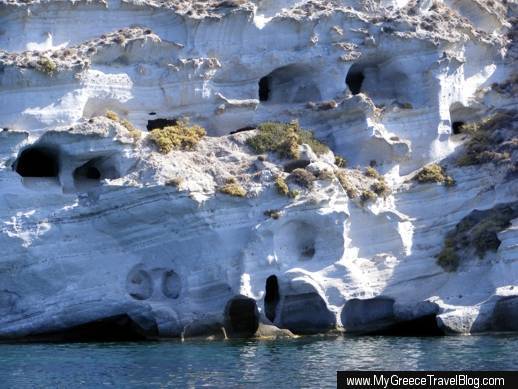
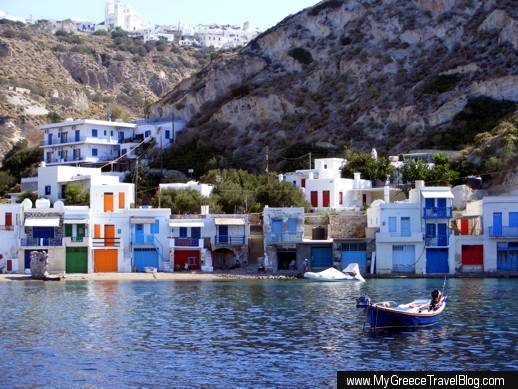

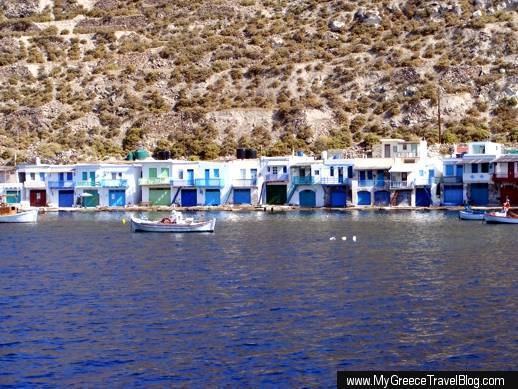
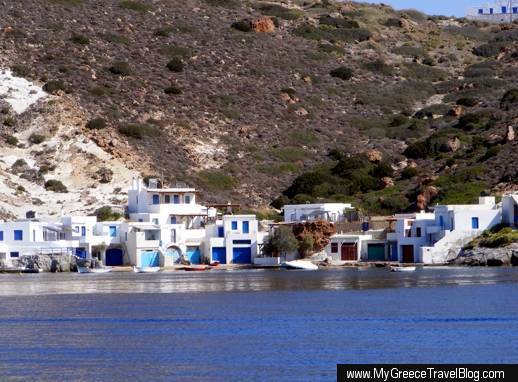
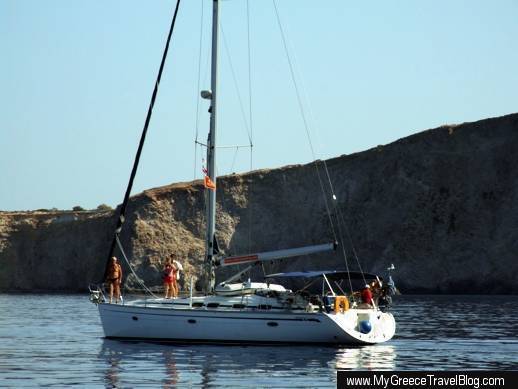
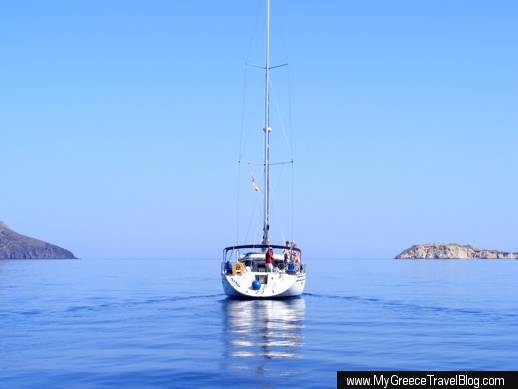
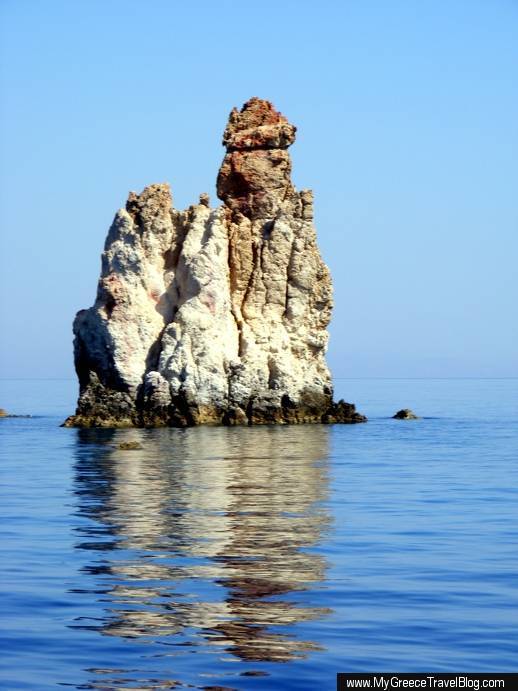
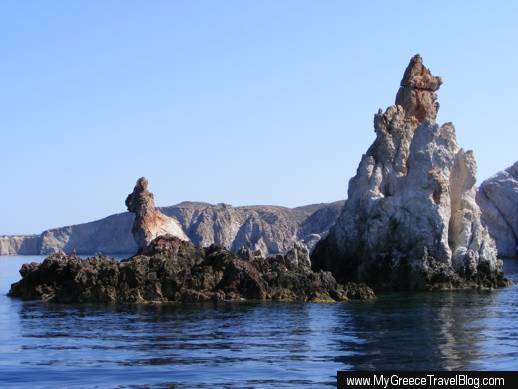
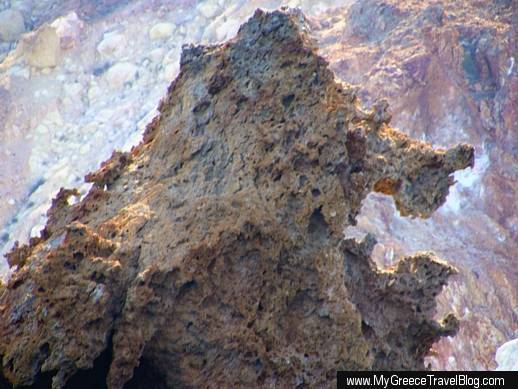
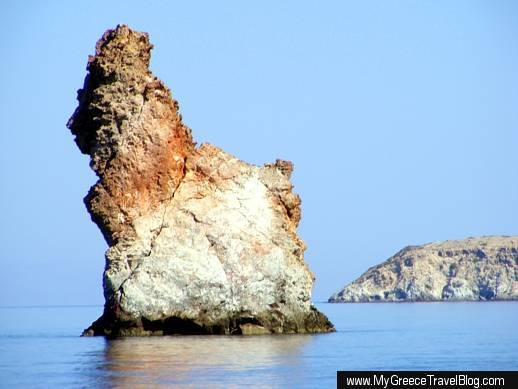

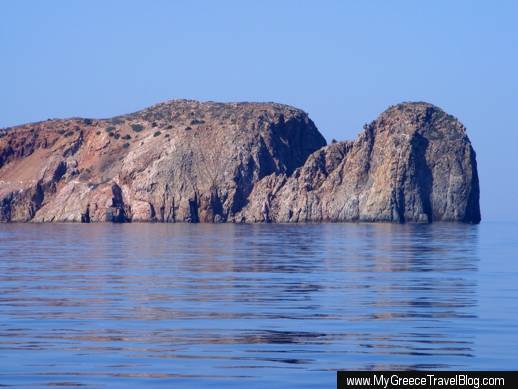
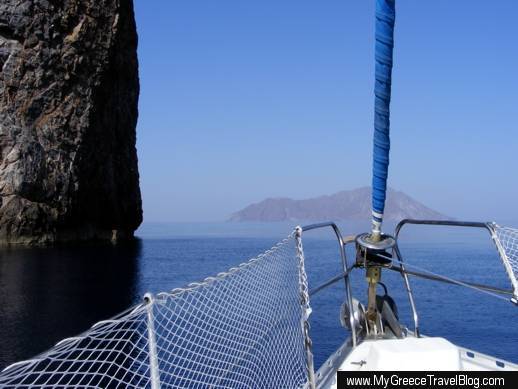
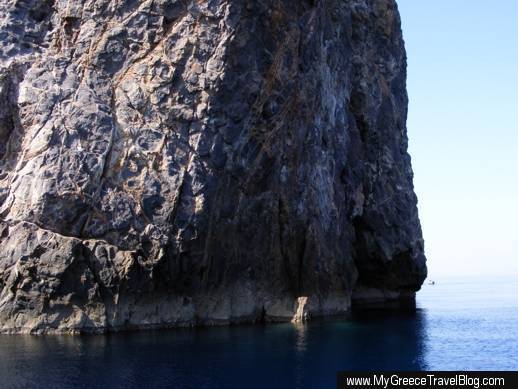
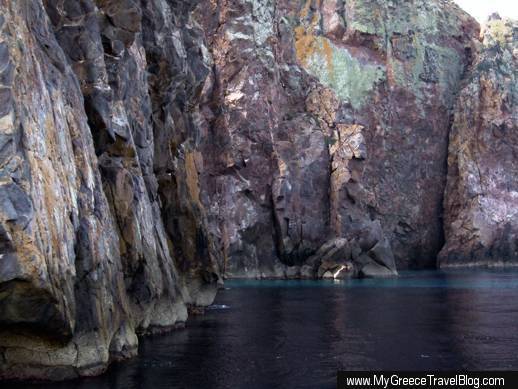
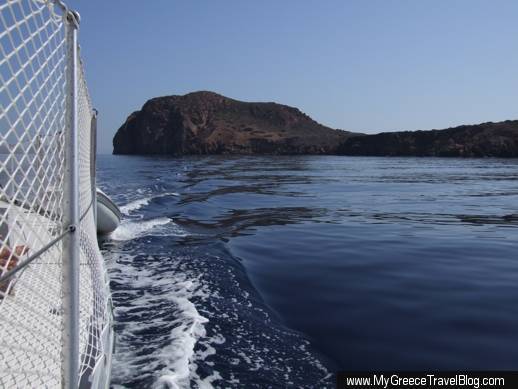
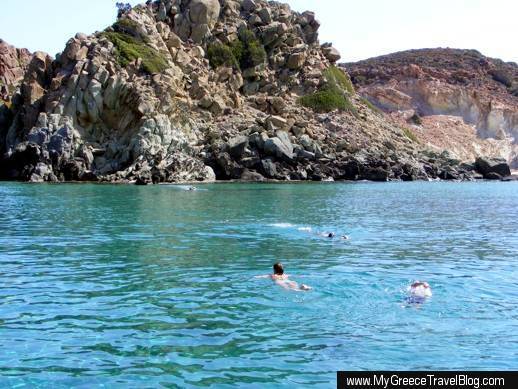
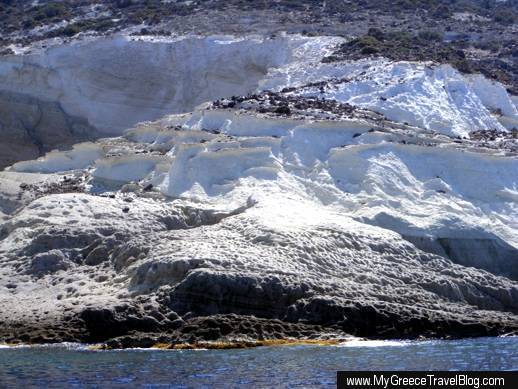
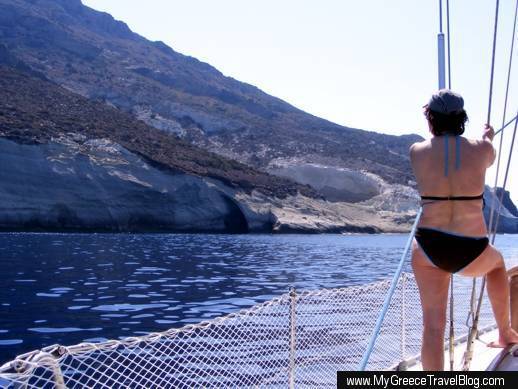
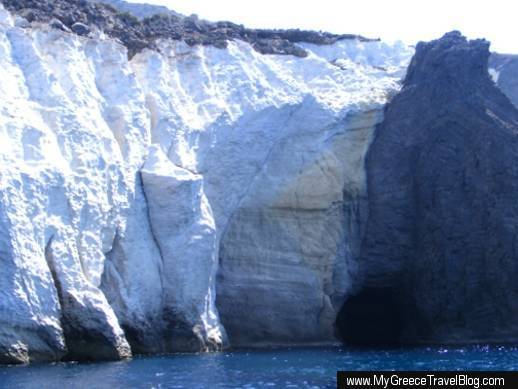

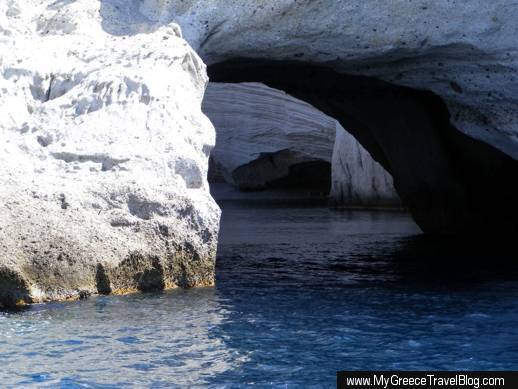
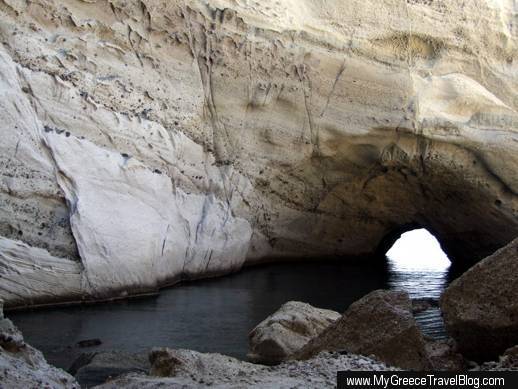
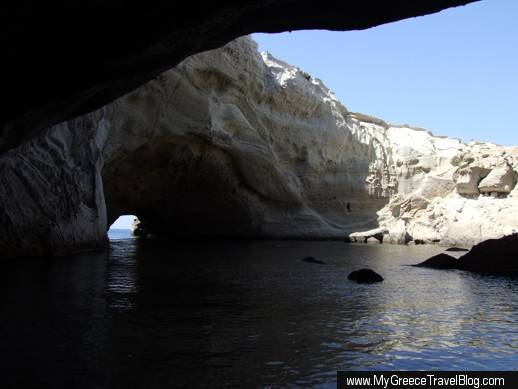
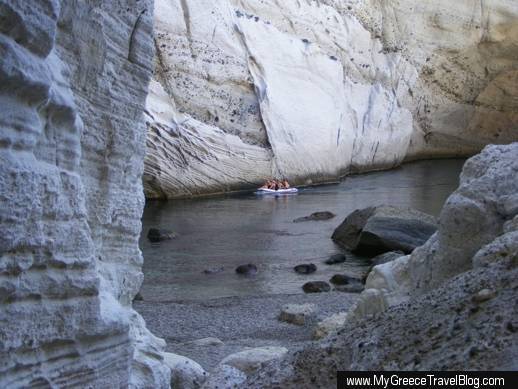
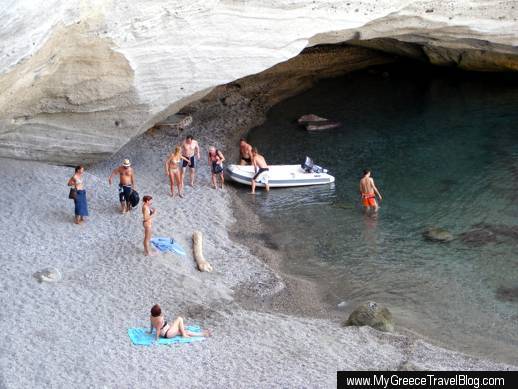
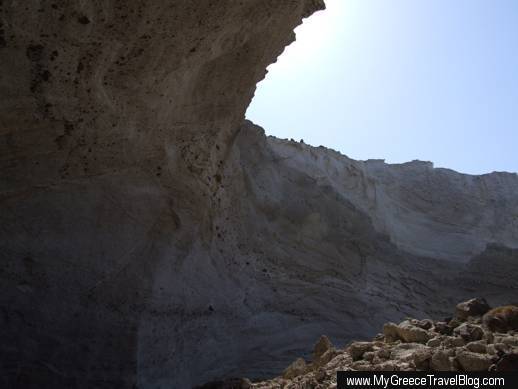
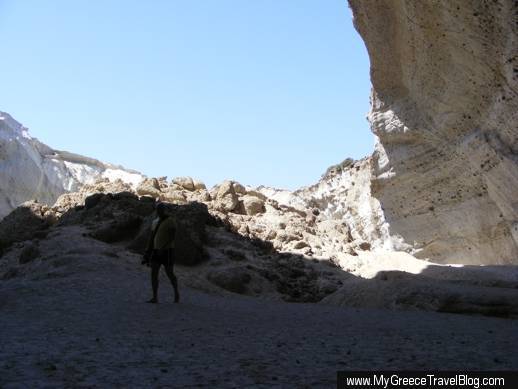
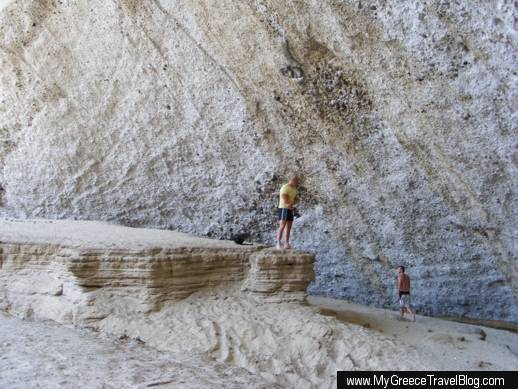
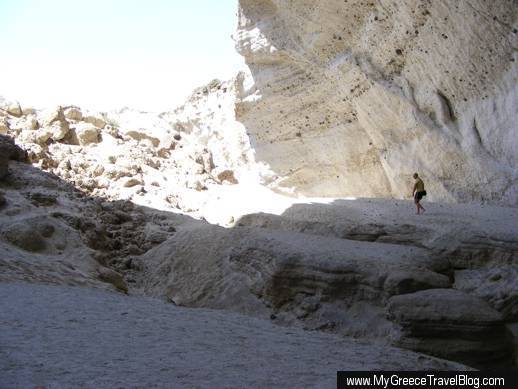
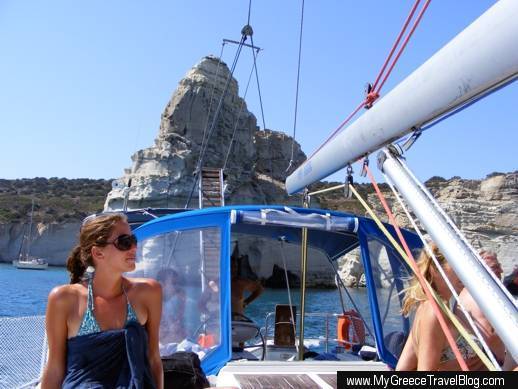
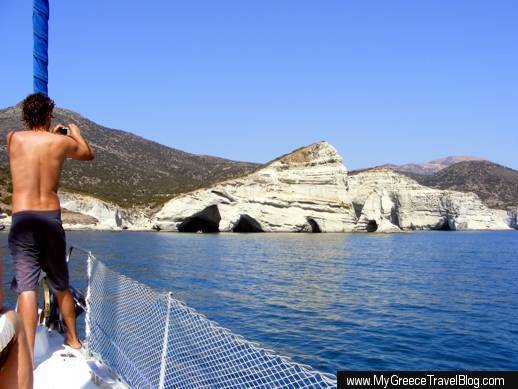
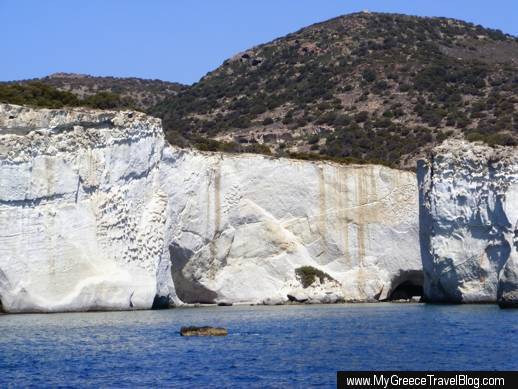
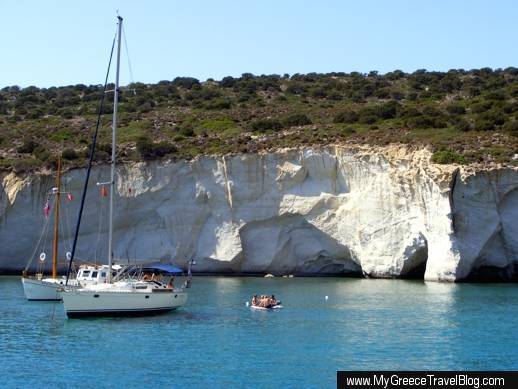
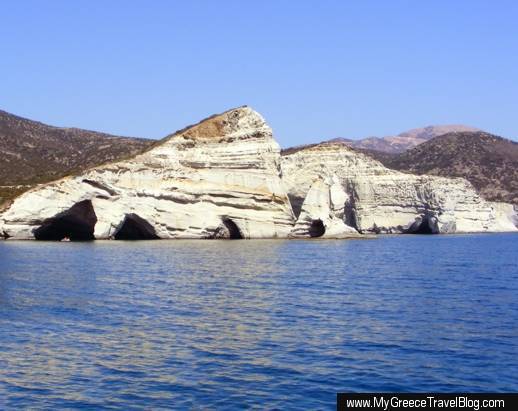
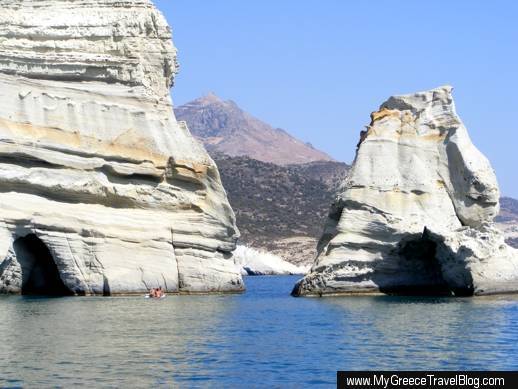
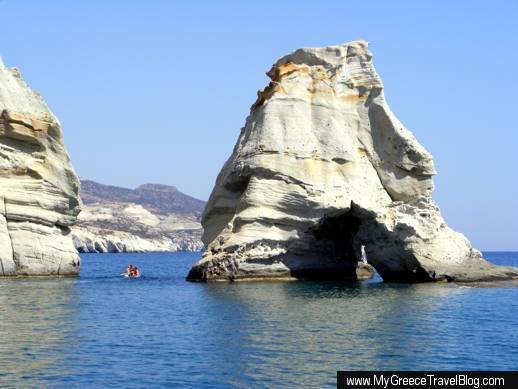
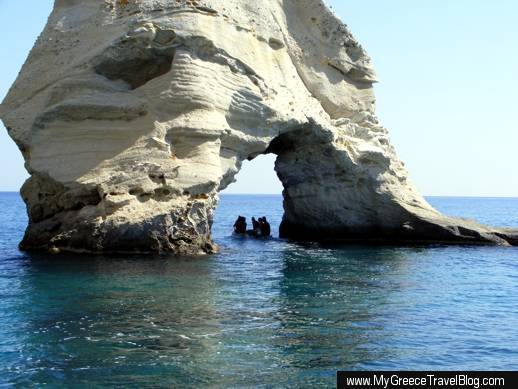
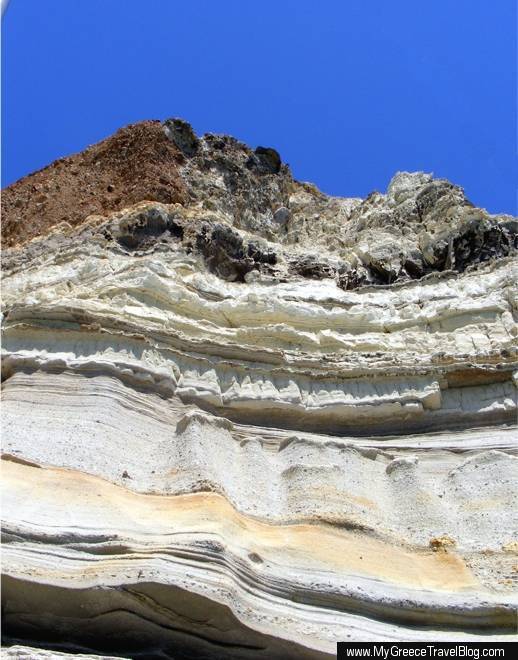
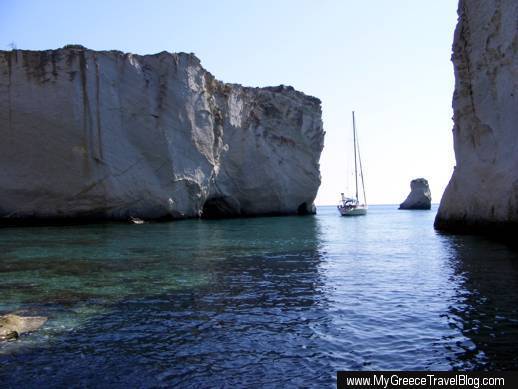
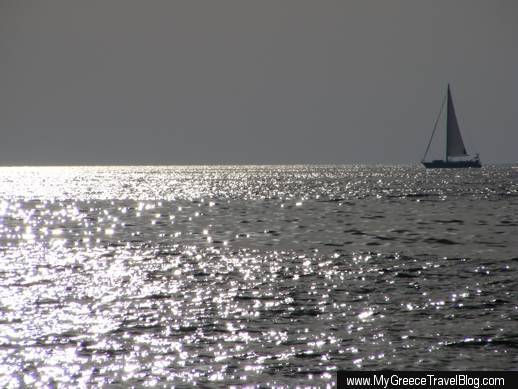
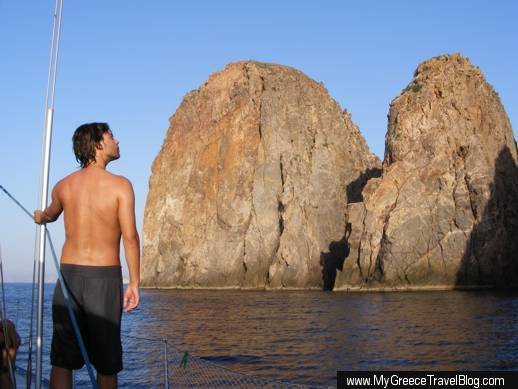
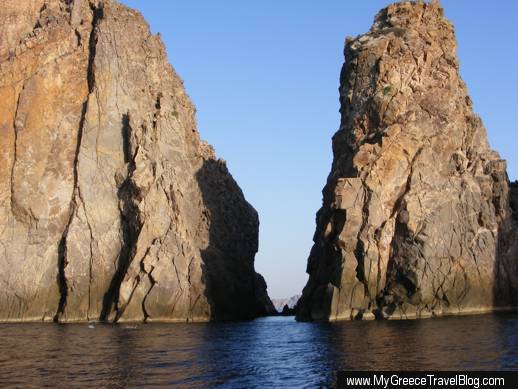
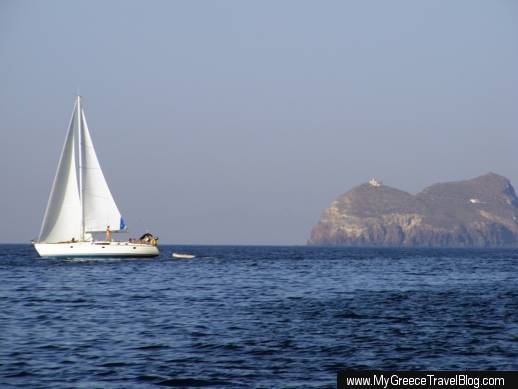
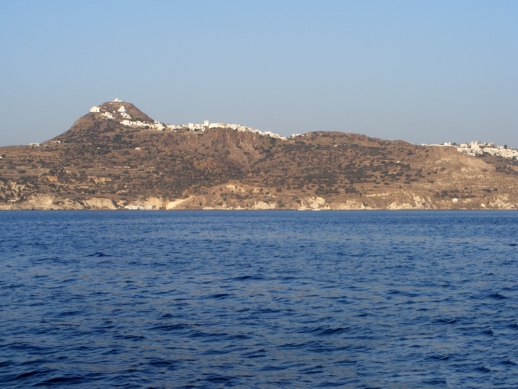
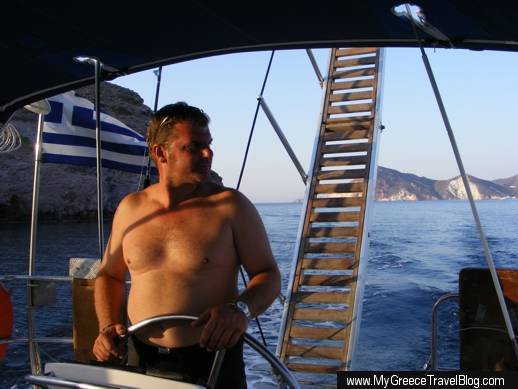
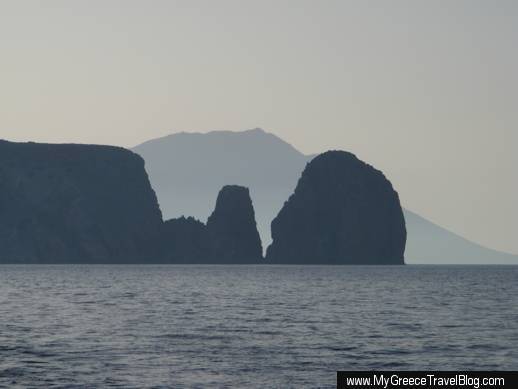
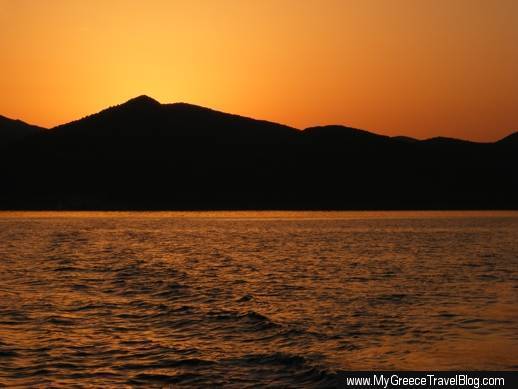
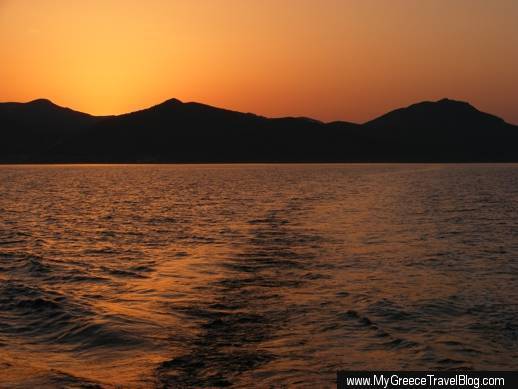
Loved the pics of the bears. We had a great trip to Milos, but never ended up doing the sail.
Still,the place continues to be our favourite Greek island.